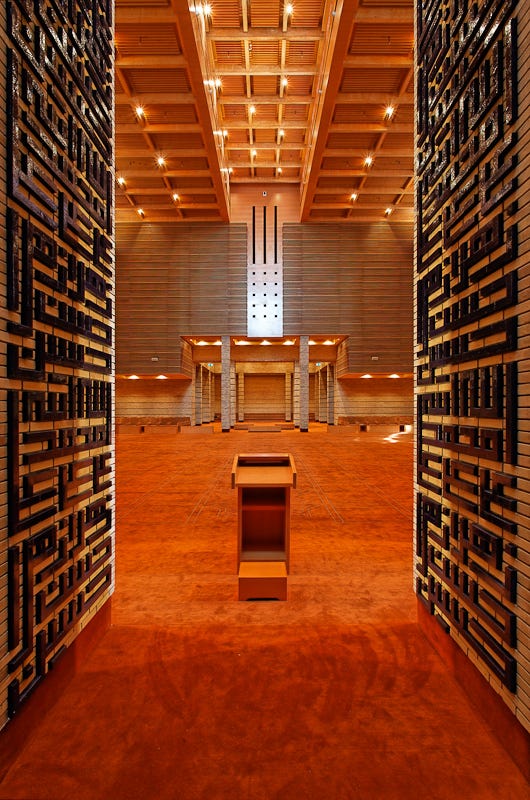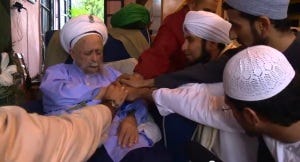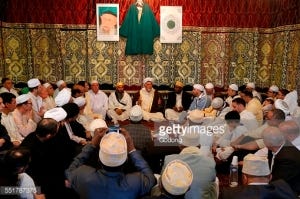Why Ismaili Jamatkhanas are only open to Ismailis for prayers
One of the ways in which Ismailis have expressed their identity wherever they have lived is through their places of prayer, known today as the Jamatkhana. Other Muslim communities give their religious buildings different names: from ribat and zawiyya to khanaqa. And, in addition, there are other places where Muslims of all interpretations can come together, such as non-denominational mosques.
Imam Shah Karim al-Husayni Aga Khan IV,
(Toronto Ismaili Centre Opening Ceremony, Toronto, September 12, 2014, Read at NanoWisdoms)
Bay‘ah is the spiritual contract or covenant that every Ismaili Muslim or murid has made with the Ismaili Imam of the Time. Bay‘ah gives the murid the right to access the Imam’s teachings, guidance, blessings, and spiritual medicine, and the Jamatkhanah is the private space where the Imam makes these available to his murids. The bay‘ah, a word which means “buying/selling”, is a two-way contract that includes a commitment from the murid and a commitment from the Imam. Thus, the bay‘ah between the murid and the Imam is a spiritual “transaction” or “contract” in which the murid commits his allegiance, devotion, and obedience (walayah) in exchange for the Imam’s spiritual guidance, intercession, blessings, and purification – in this world and in the afterlife.
You perform bay‘ah, but you must first understand it’s meaning and then offer bay‘ah. When you offer me bay‘ah it means that you extend your hand to me with a promise…He who obeys me and promises to follow me after offering me bay‘ah I also give him my promise that I shall hold his hand in the Hereafter. The trials and tribulations of the Day of Judgment are very frightening and painful. I will keep him away from this.
Imam Sultan Muhammad Shah Aga Khan III,
(Manjewadi, October 31, 1903, quoted in Kamaluddin Ali, Practices and Ceremonies)
Since bay‘ah is a two-way contract involving both the murid and the Imam, only those who have given bay‘ah to the Imam of the time have access to private discursive spaces and private religious practices offered by the Imam in the Jamatkhanah, while those who do not give this bay‘ah are not privy to them. This only makes logical sense because every single Ismaili ritual practice performed in the Jamatkhanah is an expression and an enactment of the Imam-murid relationship, a relationship that only exists through bay‘ah. The act of bay‘ah indicates that a person accepts the Ismaili Imam as his or her spiritual master and guide and accordingly, only after this acceptance does it become appropriate to access the Imam’s guidance. It simply makes no sense for someone who has not given bay‘ah to participate in the Jamatkhanah practices. Accessing the Jamatkhanah practices without giving bay‘ah to the Imam is similar to walking into a store and stealing products without paying for them, or trying to access prescription drugs from the pharmacy without having the doctor’s prescription.
It is incumbent upon the parents that they should first make their children my murid through the performance of bay‘ah…Those who have not offered bay‘ah they have not signed to accept our faith. Just as you sign on an agreement in your business and in other dealings, similarly, through bay‘ah, I take signature from your soul.
Imam Sultan Muhammad Shah Aga Khan III,
(Kutch Nagalpur, November 27, 1903)
Bay‘ah as a religious practice goes back to the lifetime of Prophet Muhammad and the Qur’an mentions it in numerous verses (48:10, 16:91, 48:18, and 60:12) in which the believers give bay‘ah to the Prophet Muhammad when they become his followers or reaffirm their loyalty to him. The Qur’an stipulates that the Prophet should only provide guidance, blessings, and intercession to people after they give him their bay‘ah. The Ismailis have continued this Qur’anic protocol of bay‘ah throughout their history:
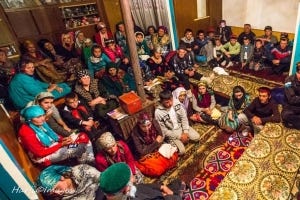
The custom of meeting in closed sessions, at specially designated places, to learn about and practice their own interpretations of faith, has been part of the Ismaili tradition from pre-Fatimid times. During the Fatimid period, the Ismailis used to participate in majalis al-hikma (sessions of wisdom), which were accessible only to those who had pledged their allegiance to the Imam-of-the-time.
Karim Jiwani, (Muslim Spaces of Piety and Worship, Read at IIS Website)
Meeting in restricted private spaces for learning and worship has been the norm in Ismaili history from the beginning. However, this custom is not an exclusively Ismaili phenomenon; Sufi Muslims throughout the ages have congregated in restricted private spaces for prayer, knowledge discourse, and spiritual practices. Most Sufis require the disciple (murid) to make bay‘ah with the Sufi master (shaykh) in order to participate in certain religious practices:
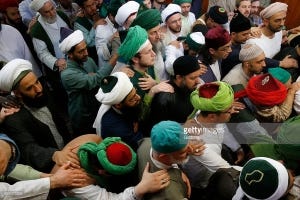
Over the course of many centuries, Sufi tariqas (orders) have multiplied and spread all over the Muslim world, from North Africa to the Indian subcontinent. The spread of these tariqas was accompanied by the construction of specific spaces of gathering and their particular forms and expressions of rituals…Elaborate initiation rituals developed in which the disciple had to pronounce the bay‘ah (oath of allegiance) to the murshid and be invested with symbols of their entrance into the order (e.g., cloak, hat, etc.). As it was common for many Sufi shaykhs to be buried in their ‘place of residence’ (khanaqah), these spaces have become popular pilgrimage sites (ziyarat) to seek barakah and shafa‘a (intercession). Admission to such spaces is usually open to all, but this is not universally true. For instance, khanaqahs of the Suhrawardi Order in India are known to restrict participation to those who have given their bay‘ah, pledge of allegiance, to the pir or shaykh of the Sufi Order. With regard to the issue of the exclusivity of such spaces, Sunni jurists have viewed it to be a matter dependent on custom…Furthermore, in some European and American cities where Sufi tariqahs are emerging and growing, one can find similar institutions (such as zawiyah and khanaqah), often in private, where adherents meet regularly to perform acts of worship that closely resemble tariqah religious practices.
Karim Jiwani, (Muslim Spaces of Piety and Worship, Read at IIS Website)
Similar to the Ismaili Muslims, the Chishti Sufi order in South Asia designates its private spaces of prayer and congregation by the name “Jama‘at-Khanah,” which was usually the residence of the Sufi Chishti Master (shaykh):
The center of activities among the Chishtis was called the jama‘at khāna, literally “the house of gathering.” Unlike the khanqah of Iran and central Asia, which might often be a large establishment supported by endowments, the Chishti jama‘at khana was essentially the residence of the shaykh. Meals were taken there, people slept there, and the basic teaching activities, interviews, and rituals (including sama‘) also took place in central room of the jama‘at khana. Early Chishti masters such as Farid al-Din Ganj-I Shakkar insisted that this was the normal practice of association for the order…Farid al-Din Ganj-i Shakkar’s concept of jama‘at khana was that it be hidden from the people, a retreat rather than a showplace. Nizam al-Din Awliya also maintained a simple jama‘at khāna, and the same organization was followed by Burhan al-Din Gharib and Zayn al-Din Shirazi. The desire for privacy was probably the reason for the selection of Khuldabad, several miles away from the Daulatabad fort, as the site for Burhan al-Din Gharib’s jama‘at khana.
Carl Ernst, (Eternal Garden: Mysticism, History and Politics at a South Asian Sufi Center, 132)
The Sufi private spaces – the ribat, khanaqa, zawiya, etc. – and the Ismaili private space, the Jamatkhanah, are different from the institution of the mosque (masjid). A mosque is a nondenominational space that serves Muslims of the exoteric public domain known as the shari‘ah. Sufi and Ismaili prayer spaces are private denominational spaces and serve specific communities who participate in the esoteric domain of Islam known as tariqah – this is why Ismailism and the Sufi brotherhoods are called “tariqahs” today. Entrance into a tariqah is only by way of the bay‘ah (as explained above).
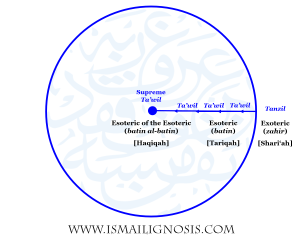
The Tarîqah or Spiritual Path which is usually known as Tasawwuf or Sufism is the inner and esoteric dimension of Islam and like the Sharî`ah has its roots in the Quran and prophetic practice. Being the heart of the Islamic message it, like the physical heart, is hidden from external view, although again like the heart it is the inner source of life and the centre which coordinates inwardly the whole religious organism of Islam. The Tarîqah is the most subtle and difficult aspect of Islam to understand at the same time that its external effect is to be seen in many manifestations of Islamic society and civilisation.
Seyyed Hossein Nasr, (Ideals and Realities of Islam)
Most importantly, Tariqah-Islam is a higher domain of Truth and practice than Shari‘ah-Islam. This is because Tariqah-Islam is an esoteric spiritual Islam that is explorative whereas Shari‘ah-Islam is an exoteric legal Islam that is prescriptive – so the rules, practices, and norms governing each domain are different. The difference between exoteric legal Islam and esoteric spiritual Islam naturally necessitates separate physical spaces for the people of the Tariqah to practice their forms and levels of Islam. As renowned scholar of Islam, Shahab Ahmed explains:
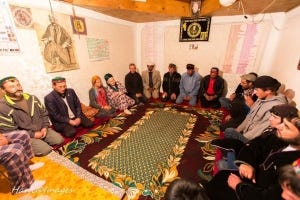
Those capable of higher truths should have available for them existential spaces where they can meet to discourse and transact and otherwise explore in terms of higher truth. The logic of Revelation necessitates, in other words, separate physical and social domains of public/Seen physical and social space and private/Unseen physical and social space as differentiated spaces for the social elaboration and operation of spatially-differentiated truths and meanings. It cannot be emphasized enough, however, that, as a space for discourse, what I am calling “private discursive space” is very much a social space—that is to say, it is a space not of individual secrecy, but rather a restricted collective space in which for people to gather in private society for discourse (and performance) of Truths not appropriate to unrestricted common and public space and society. As such, it is a sort-of public-private space, or a private-public space. It is, precisely, the communicative space of a more-or-less self-constituting class of persons who mutually recognize the capacity of their peers to entertain and deal with the communication and practice of complex, and often contradictory, exploratory truths. Thus the act of meaning-making is personal in that it is made in the individual self, public in that it is communicated to others, and private in that it is communicated to a limited and qualified public. This mutual recognition requires, of course, that there be something that makes people mutually recognizable. That something is, by and large, a shared education productive of shared attitudes to the nature of Truth. It is, in other words, “the whole intellectual and spiritual world revealed by education into which an individual is born” that makes the one person recognizable to the other as a partaker in the discourses and practices and meanings…When discourse and actions remain in the space of the private/high/khāṣṣ they are unaffected by the normative truths and values of ʿāmm/lower/public space—and are in that space governed by the normative truths and values of private/high/khāṣṣ space.
Shahab Ahmed, (What is Islam? The Importance of Being Islamic, 2015, 378-385)
The Ismaili Jamatkhanah is established by the Imam of the Time as the “House of the Imam” for a specific local Ismaili community. The Qur’an lays out a specific protocol for anyone who wishes to enter into the House of the Prophet or the houses of people in general:
O you who have believed, do not enter the houses of the Prophet except when you are permitted.
– Holy Qur’an 33:53O ye who believe! enter not houses other than your own, until ye have asked permission and saluted those in them: that is best for you, in order that ye may heed (what is seemly).
– Holy Qur’an 24:27
In conclusion, while the non-denominational masjids or mosques are public places for the rituals of the shari‘ah such as the exoteric namaz (salah), the Ismaili Jamatkhanah is a private space reserved for the practices of the Ismaili Tariqah and therefore only accessible to murids who have given bay‘ah to the Imam.
For many centuries, a prominent feature of the Muslim religious landscape has been the variety of spaces of gathering co-existing harmoniously with the masjid, which in itself has accommodated a range of diverse institutional spaces for educational, social and reflective purposes. Historically serving communities of different interpretations and spiritual affiliations, these spaces have retained their cultural nomenclatures and characteristics, from ribat and zawiyya to khanaqa and jamatkhana. The congregational space incorporated within the Ismaili Centre belongs to the historic category of jamatkhana, an institutional category that also serves a number of sister Sunni and Shia communities, in their respective contexts, in many parts of the world. Here, it will be space reserved for traditions and practices specific to the Shia Ismaili tariqah of Islam.
Imam Shah Karim al-Husayni Aga Khan IV,
(Ismaili Centre Foundation Stone Ceremony, Dubai, December 13, Read on NanoWisdoms)
